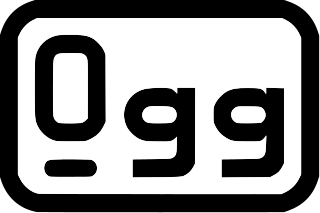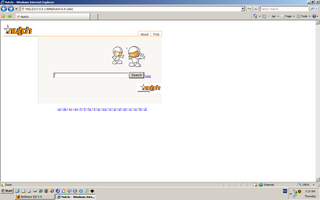
Ogg is a free, open container format maintained by the Xiph.Org Foundation. The authors of the Ogg format state that it is unrestricted by software patents and is designed to provide for efficient streaming and manipulation of high-quality digital multimedia. Its name is derived from "ogging", jargon from the computer game Netrek.

Apache Nutch is a highly extensible and scalable open source web crawler software project.

Opera Limited is a multinational technology conglomerate holding company headquartered in Oslo, Norway with additional offices in Europe, China, and Africa. Opera offers a range of products and services that include a variety of PC and mobile web browsers, GameMaker and gaming portals, the Opera News content recommendation products, the Opera Ads platform, and a number of Web3 and e-commerce products and services. The company's total user base is 311 million monthly active users.
Presto was the browser engine of the Opera web browser from the release of Opera 7 on 28 January 2003, until the release of Opera 15 on 2 July 2013, at which time Opera switched to using the Blink engine that was originally created for Chromium. Presto was also used to power the Opera Mini and Opera Mobile browsers.
Eating your own dog food or "dogfooding" is the practice of using one's own products or services. This can be a way for an organization to test its products in real-world usage using product management techniques. Hence dogfooding can act as quality control, and eventually a kind of testimonial advertising. Once in the market, dogfooding can demonstrate developers' confidence in their own products.

Fritz is a German chess program originally developed for Chessbase by Frans Morsch based on his Quest program, ported to DOS, and then Windows by Mathias Feist. With version 13, Morsch retired, and his engine was first replaced by Gyula Horvath's Pandix, and then with Fritz 15, Vasik Rajlich's Rybka.

ejabberd is an Extensible Messaging and Presence Protocol (XMPP) application server and an MQ Telemetry Transport (MQTT) broker, written mainly in the Erlang programming language. It can run under several Unix-like operating systems such as macOS, Linux, FreeBSD, NetBSD, OpenBSD and OpenSolaris. Additionally, ejabberd can run under Microsoft Windows. The name ejabberd stands for Erlang Jabber Daemon and is written in lowercase only, as is common for daemon software.

Free and open-source software (FOSS) is software that is available under a license that grants the right to use, modify, and distribute the software, modified or not, to everyone free of charge. The public availability of the source code is, therefore, a necessary but not sufficient condition. FOSS is an inclusive umbrella term for free software and open-source software. FOSS is in contrast to proprietary software, where the software is under restrictive copyright or licensing and the source code is hidden from the users.

Windows Genuine Advantage (WGA) was an anti-infringement system created by Microsoft used to validate the licences of several Microsoft Windows operating systems upon accessing services such as Windows Update and Microsoft Download Center.
Internet Content Rating Association (ICRA) was an international non-profit organization with offices in the United States and the United Kingdom. In October 2010, the ICRA rating system, and the organization, was discontinued.
Browser hijacking is a form of unwanted software that modifies a web browser's settings without a user's permission, to inject unwanted advertising into the user's browser. A browser hijacker may replace the existing home page, error page, or search engine with its own. These are generally used to force hits to a particular website, increasing its advertising revenue.

Fidelity National Information Services, Inc. (FIS) is an American multinational corporation which offers a wide range of financial products and services. FIS is most known for its development of Financial Technology, or FinTech, and as of Q2 2024 it offers its solutions in two primary segments: Banking Solutions & Capital Market Solutions. Annually, FIS facilitates the movement of roughly $9 trillion through the processing of approximately 75 billion transactions in service to more than 20,000 clients around the globe.

CamStudio is an open-source screencasting program for Microsoft Windows released as free software. The software renders videos in an AVI format. It can also convert these AVIs into Flash Video format, embedded in SWF files. CamStudio is written in C++, but CamStudio 3 will be developed in C#. The program has distributed malware and harmful viruses via the installer.

Jaiku was a social networking, micro-blogging and lifestreaming service comparable to Twitter, founded a month before the latter. Jaiku was founded in February 2006 by Jyri Engeström and Petteri Koponen from Finland and launched in July of that year. It was purchased by Google on October 9, 2007.

In geomarketing and internet marketing, geotargeting is the method of delivering different content to visitors based on their geolocation. This includes country, region/state, city, metro code/zip code, organization, IP address, ISP, or other criteria. A common usage of geotargeting is found in online advertising, as well as internet television with sites such as iPlayer and Hulu. In these circumstances, content is often restricted to users geolocated in specific countries; this approach serves as a means of implementing digital rights management. Use of proxy servers and virtual private networks may give a false location.

LeapFish.com was a search aggregator that retrieved results from other portals and search engines, including Google, Bing and Yahoo!, and also search engines of blogs, videos etc. It was a registered trademark of Dotnext Inc, launched on 3 November 2008.
Web search engines are listed in tables below for comparison purposes. The first table lists the company behind the engine, volume and ad support and identifies the nature of the software being used as free software or proprietary software. The second and third table lists internet privacy aspects along with other technical parameters, such as whether the engine provides personalization.

μTorrent, or uTorrent, is a proprietary adware BitTorrent client owned and developed by Rainberry, Inc. The "μ" in its name comes from the SI prefix "micro-", referring to the program's small memory footprint: the program was designed to use minimal computer resources while offering functionality comparable to larger BitTorrent clients such as Vuze or BitComet. μTorrent became controversial in 2015 when many users unknowingly accepted a default option during installation which also installed a cryptocurrency miner.











